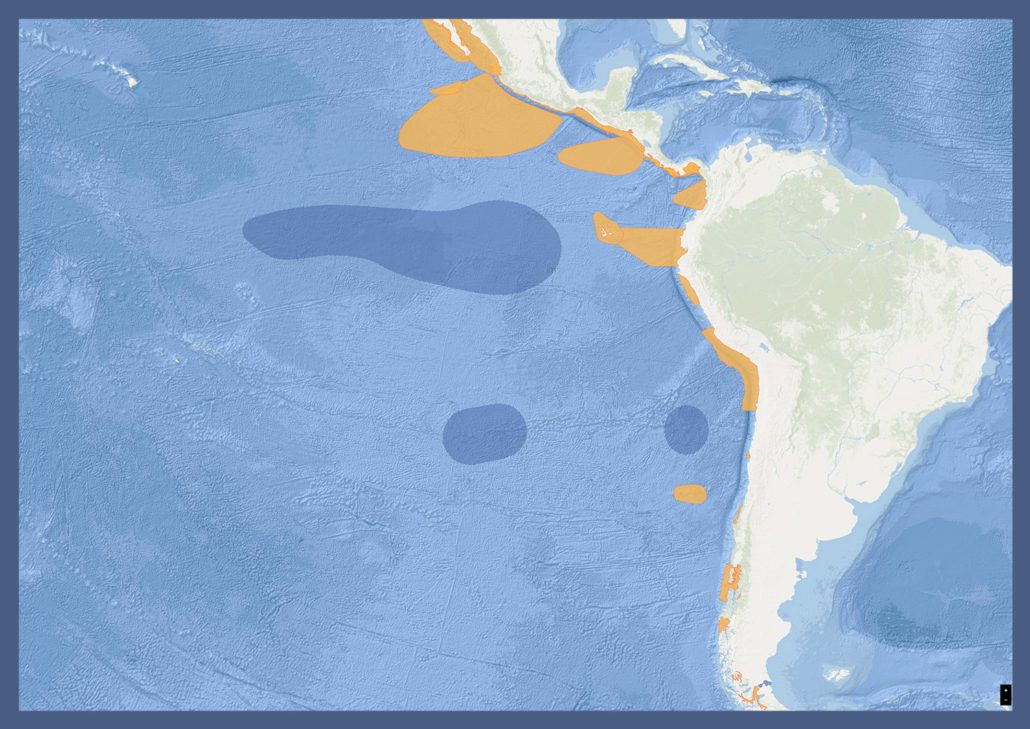South East Tropical and Temperate Pacific Ocean
San José, Costa Rica, 6-10 June 2022
South East Tropical and Temperate Pacific Ocean IMMA Workshop Executive Summary
From 6 to 10 June 2022, the IMMA Regional Workshop for the South East Tropical and Temperate Pacific Ocean was held in hybrid mode in San José, Costa Rica, with the goal to identify and delineate important marine mammal areas — IMMAs. The IMMA Secretariat of the IUCN Marine Mammal Protected Areas Task Force (the ‘Task Force’) collected 118 preliminary Areas of Interest (pAoI), 39 of which were submitted by participants before the meeting and 17 more submitted in the first two days, while the others consisted of existing marine mammal spatial designations including marine protected areas (MPAs) and ecologically or biologically significant areas (EBSAs) from the Convention on Biological Diversity. At the close of the workshop, 48 candidate IMMAs (cIMMAs) were identified and proposed through the expert-based process, utilizing dedicated selection criteria. Six additional areas would be advanced as AoI and 64 pAoI were merged or deferred. Following independent review and consideration of how the criteria supported IMMA identification, 36 IMMAs were accepted for full status with 5 remaining as cIMMAs and 11 being reserved as AoI, all of which now appear on the IMMA e-Atlas (see figure above). More details are provided later on in this summary and in Annex III and IV. Worldwide, including the South East Tropical and Temperate Pacific Ocean region, there are now 209 IMMAs, as well as 30 cIMMAs and 152 AoI.
The workshop was attended by 58 experts, including 20 observers, 14 of them remote. Of the 58 experts, 27 participated in person through the week while 4 participated remotely. There were 7 participating members of the IMMA Secretariat in attendance. In summary, the participants came from the Pacific-facing countries of Mexico to Chile, as well as from Australia, Belgium, Brazil, Italy, Netherlands, United Kingdom, and United States of America. The observers came from Chile, Colombia, Costa Rica, Dubai, Ecuador, Kenya, Peru and the USA. The workshop was organised by the Task Force with support from a partner grant with GOBI funded by the German government’s International Climate Initiative (IKI).
The experts identified cIMMAs for the first time for the Critically Endangered vaquita (Phocoena sinus) and Endangered marine otters (Lontra felina), as well as Near Threatened Burmeister’s porpoises (Phocoena spinipinnis) and Chilean dolphins (Cephalorhynchus eutropia). Other cIMMA proposals focused on populations of humpback whales (Megaptera novaeangliae) and Endangered blue whales (Balaenoptera musculus) from both the North and South Pacific, including areas that are used by humpback whales from both hemispheres when they cross the Equator in their long migrations. The full list of marine mammal species included in the region’s IMMAs, together with the boundaries of accepted IMMAs, will become available as part of the IMMA e-Atlas.
